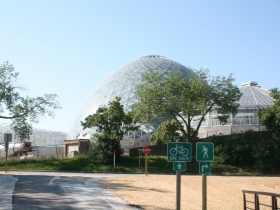Milwaukee’s Mitchell Park Domes Named to National Trust’s 2016 List of America’s 11 Most Endangered Historic Places
The list spotlights historic places across America that are threatened by neglect, insufficient funds, inappropriate development or insensitive public policy.
Washington (October 5, 2016) –The National Trust for Historic Preservation has named Milwaukee’s Mitchell Park Domes to its 2016 list of America’s 11 Most Endangered Historic Places. This annual list spotlights important examples of the nation’s architectural and cultural heritage that are at risk of destruction or irreparable damage. More than 270 sites have been on the list over its 29-year history, and in that time, fewer than five percent of listed sites have been lost.
A beloved Milwaukee institution for generations, a unique engineering marvel and a highly significant example of midcentury modern architecture, the Milwaukee Domes have been a center of community life and a tourism destination for more than 50 years. In addition to their stunning architectural features, the Domes are marvels of modern engineering featuring the world’s first “conoidal”—or cone-shaped—domes.
‘“The Domes” are stunning examples of midcentury modern architecture that have also been a key part of community life in Milwaukee for more than 50 years,” said Stephanie Meeks, president and CEO of the National Trust for Historic Preservation. “From Miami’s Marine Stadium to Houston’s Astrodome, iconic pieces of 20th century modern architecture across the country face unique maintenance needs as they age. Rather than needlessly sacrifice this unique national treasure, local leaders owe it to the public to continue to explore a solution that preserves the Domes for the benefit and enjoyment of future generations.”
Members of the public are invited to learn more about what they can do to support these 11 historic places and hundreds of other endangered sites at www.SavingPlaces.org/11Most
The 2016 list of America’s 11 Most Endangered Historic Places (in alphabetical order):
Austin’s Lions Municipal Golf Course – Austin, Texas. Widely regarded as the first municipal golf course in the South to desegregate, “Muny” is an unheralded civil rights landmark facing development pressure.
Azikiwe-Nkrumah Hall at Lincoln University – Lincoln, Pa. The oldest building on the campus of the first degree-granting institution in the nation for African Americans, this hallowed building currently stands empty and faces an uncertain future.
Bears Ears – Southeastern Utah. The 1.9 million-acre Bears Ears cultural landscape features a world-class collection of archaeological sites, cliff dwellings, petroglyphs, and ancient roads that illuminate 12,000 years of human history yet is now threatened by looting, mismanaged recreational use, and energy development.
Charleston Naval Hospital District – North Charleston, S.C. The historic district played a prominent role during WWII as a primary re-entry point for American servicemen injured in Europe and Africa. Now threatened by a proposed rail line, this important historic resource is at risk of being largely destroyed.
Delta Queen – Houma, La. This steamboat was built in 1926 and today is among the last of her kind. Federal legislation that would enable this prestigious ship to return to overnight passenger cruising remains a key piece to securing the Delta Queen’s sustainability and future.
El Paso’s Chihuahuita and El Segundo Barrio Neighborhoods – El Paso, Texas. These historic neighborhoods form the core of El Paso’s cultural identity, but their homes and small businesses are threatened by demolition.
Historic Downtown Flemington – Flemington, N.J. Historic buildings at the core of the town that hosted the ‘Trial of the Century,’ the Charles Lindbergh baby kidnapping trial, are threatened by a development proposal that would demolish the iconic Union Hotel along with three other adjacent historic buildings.
James River – James City County, Va. Jamestown, America’s first permanent English settlement, was founded along the banks of the James River in 1607. The river and landscape, also named to this list by the Trust in 2013, remain threatened by a proposed transmission line project that would compromise the scenic integrity of this historic area.
Milwaukee’s Mitchell Park Domes – Milwaukee, Wis. A beloved Milwaukee institution for generations, a unique engineering marvel and a highly significant example of midcentury modern architecture, the Milwaukee Domes are facing calls for their demolition.
San Francisco Embarcadero – San Francisco, Calif. The City by the Bay’s iconic waterfront is beloved by residents and visitors alike, but needs long-term planning to address the dual natural threats of sea level rise and seismic vulnerability.
Sunshine Mile – Tucson, Ariz. This two-mile corridor on Tucson’s Broadway Boulevard features one of the most significant concentrations of historic mid-century modern architecture in the Southwest. This unique collection of properties face threats from a transportation project that would require demolition.
Follow us on Twitter at @savingplaces and join the conversation using the hashtag #11Most
America’s 11 Most Endangered Historic Places has identified more than 270 threatened one-of-a-kind historic treasures since 1988. Whether these sites are urban districts or rural landscapes, Native American landmarks or 20th-century sports arenas, entire communities or single buildings, the list spotlights historic places across America that are threatened by neglect, insufficient funds, inappropriate development or insensitive public policy. The designation has been a powerful tool for raising awareness and rallying resources to save endangered sites from every region of the country. At times, that attention has garnered public support to quickly rescue a treasured landmark; while in other instances, it has been the impetus of a long battle to save an important piece of our history.
The National Trust for Historic Preservation, a privately funded nonprofit organization, works to save America’s historic places. www.SavingPlaces.org
The Domes
NOTE: This press release was submitted to Urban Milwaukee and was not written by an Urban Milwaukee writer. While it is believed to be reliable, Urban Milwaukee does not guarantee its accuracy or completeness.
Mentioned in This Press Release
Recent Press Releases by National Trust for Historic Preservation
National Trust for Historic Preservation Conference in Milwaukee for the First Time
Sep 4th, 2025 by National Trust for Historic PreservationPastForward 2025 to welcome 800+ preservation leaders, feature field studies at Milwaukee landmarks
National Trust for Historic Preservation Critiques New Consultant Report on Shared Facility for Mitchell Park Domes and Milwaukee Public Museum
Mar 11th, 2019 by National Trust for Historic PreservationStatement by Barb Pahl, Senior Vice President, Field Services, National Trust for Historic Preservation
Milwaukee’s Mitchell Park Domes Named to National Trust’s 2016 List of America’s 11 Most Endangered Historic Places
Oct 5th, 2016 by National Trust for Historic PreservationThe list spotlights historic places across America that are threatened by neglect, insufficient funds, inappropriate development or insensitive public policy.



























